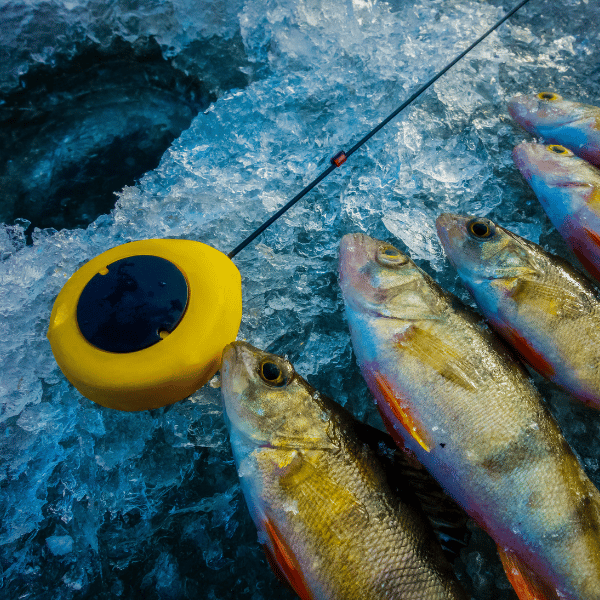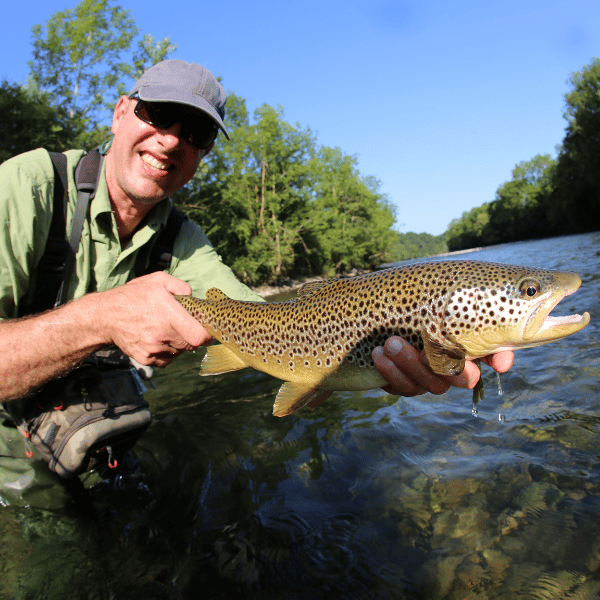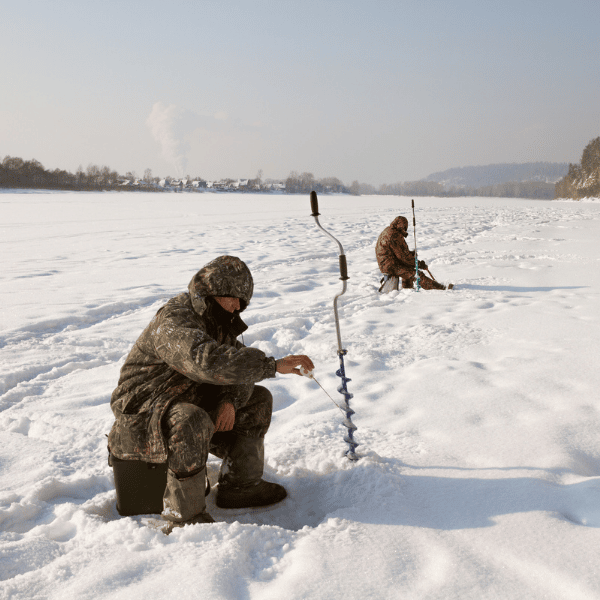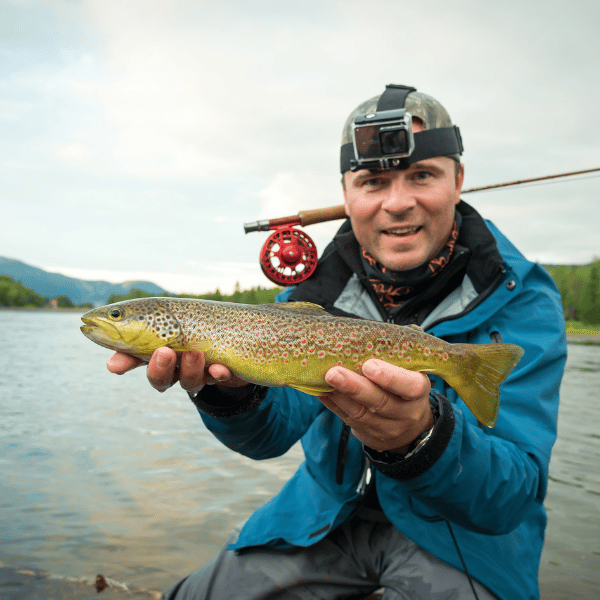Differences Between Fly Fishing vs Spin Fishing
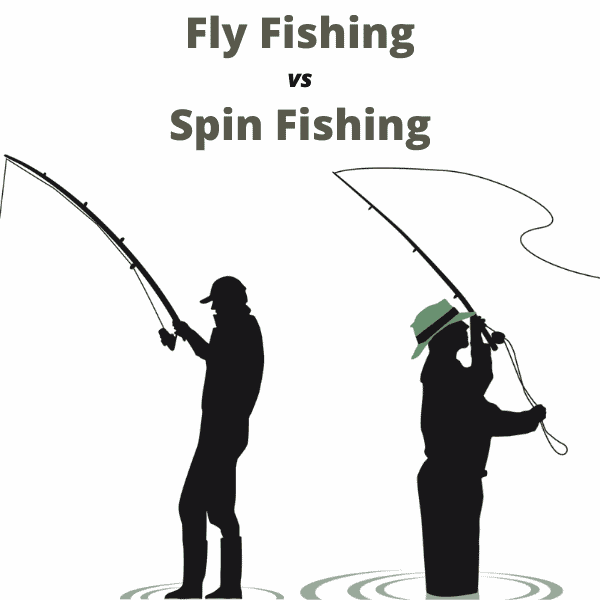
Wondering what are the differences between fly fishing vs spin fishing?
Which type of fishing is better for what types of fish?
In this article, we will go through the differences between fly fishing vs spin fishing, is fly fishing harder than spin fishing, and which type of fishing is better and when.
Contents
Fly Fishing vs Spin Fishing
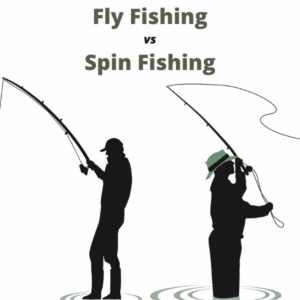
Fly fishing is a time-tested art, an elegant way to land trout and other bug-loving fish. But for years, people have been debating whether fly fishing or spin fishing is better. Does one method catch more fish? Is one method more fun? Is one method easier to use than the others?
It can be easy to get sucked into all kinds of superfluous details. For instance, some people get hung up on rigging methods, or on ice fishing in Saskatchewan in late February. We get it. There are all kinds of specific scenarios where one method might be better than the other.
Here, we’ll take a broad look at the differences between fly fishing vs. spin fishing. We’ll look at the differences in gear, as well as the differences in technique. We’ll also talk about the reasons some anglers prefer one method over the other. After that, you’ll know everything you need to know to get started. Who knows? You might even take up both types of fishing!
Difference Between Fly Fishing & Spin Fishing

The most obvious difference between fly fishing and spin fishing is how the line is cast. With a spin fishing rod, you cast the line in a single motion, then crank the line back in using the reel. You might also use a jigging motion, or troll the line behind you depending on the circumstances. With a fly fishing rod, you move the rod in a wider arc, and the line swooshes behind you. Why is that?
A spin fishing rod uses a lure, or sometimes live or dead bait. The weight of this lure or bait, often combined with a lead weight, is used to add momentum to the line and pull it out of the reel. This doesn’t work for fly fishing, though. With fly fishing, your bait is a lightweight hook with a fly on it, and attaching a weight would spook your target fish. Instead, a fly rod relies on the weight of the line to add momentum.
Spinning rods can cover a lot more water more quickly than fly rods. This is a consequence of their fast casting and retrieving motion. And if you’re trolling on a boat, you can run multiple spinning rods simultaneously with rod holders. This is not possible with fly fishing.
Furthermore, spin fishing lets you use a variety of lures and live baits. Crankbaits, jerk baits, and live crayfish just aren’t an option on your fly rod.
That said, fly fishing lets you use tiny bait that won’t work on a regular rod. For some species of fish, such as trout, this is ideal. Trout love insects, the smaller and flightier the better! As a matter of fact, trout fishing has become such a stereotype that many people believe fly fishing is only useful for trout. Far from it! You can use a fly rod to catch any fish that likes bugs or small baitfish.
There’s a similar myth that fly fishing can only be done in freshwater. This is no doubt due to the widespread image of a trout fisherman wading in a lazy river. But fly fishing, like spin fishing, can also be done in saltwater, provided your equipment is sturdy enough for the task.
The final important difference is that besides your rod and reel, fly fishing requires less and lighter equipment. This means you can carry your gear in a vest or a satchel. There’s no need to carry a whole tackle box, as you would if you were going spin fishing.
Is Fly Fishing Harder Than Spin Fishing?
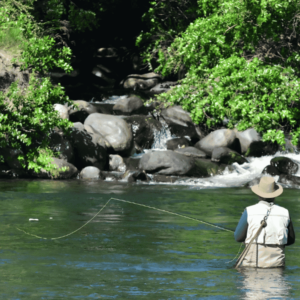
We’ve talked a fair bit about the different gear you use for spin fishing vs fly fishing. That said, the main difference, at least from an angler’s perspective, is in how that equipment is used. After all, you still use a rod, reel, and a lure. It’s just a different technique.
At first glance, the technique also seems more or less the same. You move the rod backward, and it flexes, then springs back forward when you move the rod forward. This propels the line out of the reel. However, a tiny fly lure needs a bit of help to get moving.
Part of this help comes from the length of the fly rod, which will be longer than a spinning rod. A fly rod is also typically more flexible, so it will start to sway under less weight than a spinning rod.
The other help comes from your technique. Instead of casting in one smooth motion, you move the rod back and forth, releasing a bit more line with each movement. As more line is released, there’s a bit more weight on the rod, so more line comes out with each additional movement.
There are advanced techniques that involve pulling, or “hauling” on the line to make it reel out faster and bend the rod more. Before you do that, though, you’ll want to focus on the basics.
Learning the basic casting technique is the hardest part about learning fly fishing. It can take a few hours to get the basics down, while spin fishing is fairly straightforward. That said, once you’ve learned either method, neither one is difficult. It’s just a matter of how much practice you need in order to get started.
That said, there are some things that are still easier to do with a spinning rod. For one thing, because the rod is shorter and requires less movement, it’s easier to cast in tighter areas. You just flick the rod backward, then forwards, without needing to let a lot of line out behind you.
Certain techniques are also easier if you’re spin fishing. For instance, many lures are designed to be reeled in along the surface. With a spinning rod, you can cast and retrieve these relatively quickly. If you try to use them with a fly rod, you’ll have to spend time letting line out before each cast. This is unnecessarily complicated, and it’s one reason why many enthusiastic fly fishermen also own a spinning rod for fishing certain species.
When is Fly Fishing Better than Spin Fishing?
There are a number of reasons that fly fishing can be better than spin fishing. The most obvious reason is that you can catch fish under conditions where a spin rod would fail. For instance, trout are notorious for being easily spooked. On a smooth day, it can be impossible to land a spin rod lure anywhere near them without scaring them off. Fly fishing is a lot less splashy, relying on the motion of the tiny lure to attract the fish instead. For some species, this can be the most effective method of fishing.
Along the same lines, when you’re fly fishing, you can use very small lures that won’t work on a spinning rod. We’ve already talked about how much trout like flies, but there are plenty of picky fish out there. If you’re not getting any bites with larger lures, a fly or streamer can make all the difference.
We’ve talked a lot about equipment, and about how many fish you can catch. But fishing isn’t just about mechanics, or about catching as many pounds of fish as you possibly can. For many people, fishing is about spending time in the great outdoors and enjoying the fresh air. Fly fishing has a slower pace than spin fishing, so you’ll have more time between bites to take in the experience.
Finally, let’s not forget about the fish’s side of the experience. Most spin fishing lures use large triple hooks, which can do a number on a fish’s mouth. This can be cruel, especially if you’re releasing the poor thing back out into the wild. Fly lures are smaller, and only use a single hook. This does less damage to the fish, so they’ll be stronger and healthier after you’ve released them.
When is Spin Fishing Better than Fly Fishing?
With all of those fly fishing benefits, you might be wondering why anyone would want to go spin fishing. To begin with, there’s the wider bait diversity, as we’ve already mentioned. Trout fishing aside, you can catch a wider variety of species. With crank baits in particular, you can reach greater depths to access fish that are further from the surface.
Another main benefit of spin fishing is that it’s more efficient. Assuming two fisherman of the same skill level, the one with the spinning rod will catch more than the one with the fly rod in the same period of time. This might not be ideal for catch-and-release fishing. But if you’re going to eat your catch, the damage from the larger hooks won’t be a concern.
Ultimately, spin fishing might not be the same relaxed, natural experience as fly fishing. But you still get to spend time in nature, and in most cases, you have a better chance of getting a few bites. For many people, that’s all you need.

